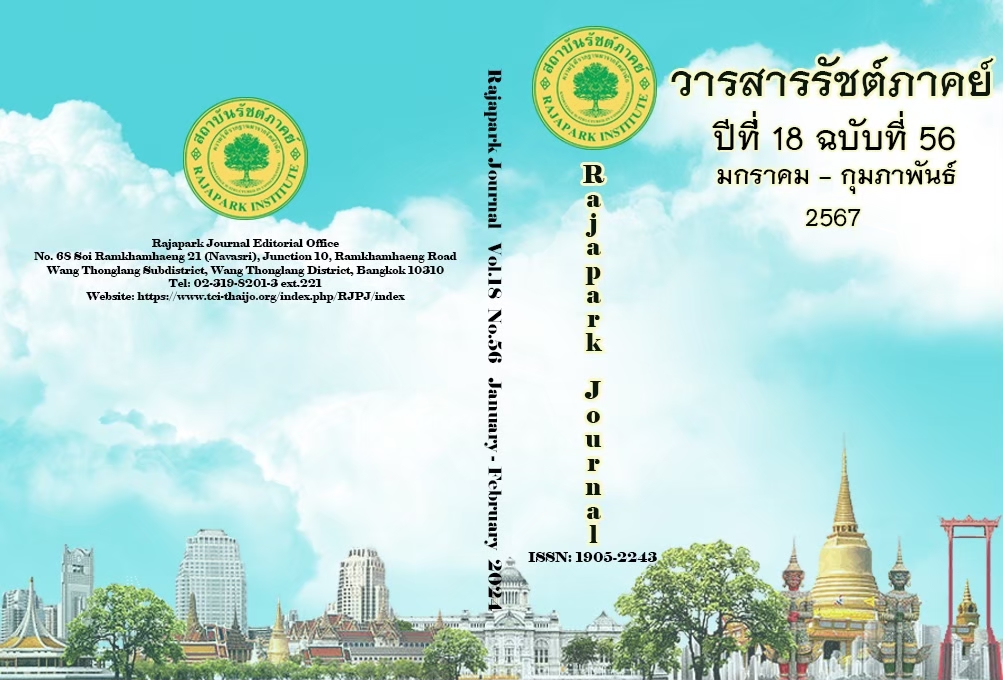TPACK Model Online Learning
Main Article Content
Abstract
The spread of the COVID-19 virus has caused a lifestyle change, and people in society have had to adapt to a new way of life, known as the 'New Normal'. In terms of education, where classroom-based teaching cannot be conducted, it has become necessary to transform teaching and learning into an online format to ensure continuous learning for students. The objective of this article is to focus on explaining the TAPCK MODEL framework, which combines teaching methods and technology. It analyzes teaching and learning activities that integrate technology and applies them to online teaching and learning. It has been found that the TAPCK model for online teaching and learning consists of three components: technology, teaching methods, and content knowledge. Considering appropriate components and formats that align with the nature of the subject and the context of learners will lead to effective application in online teaching and learning, resulting in desired learning outcomes for students.
Article Details

This work is licensed under a Creative Commons Attribution-NonCommercial-NoDerivatives 4.0 International License.
Views and opinions appearing in the Journal it is the responsibility of the author of the article, and does not constitute the view and responsibility of the editorial team.
References
Education Technology Development and Integration Support. (2020). Preventing Exam fraud During COVID-19 with Online Proctored Exam. https://www.ets.kmutt.ac.th/post/covid-19-online-proctored-exam-1
Khan, B. H. (2017). Managing E-Learning. (Ophat Kaosaiyaporn et al., Translated.) Research Center for Educational Innovations and Teaching and Learning Excellence, Prince of Songkhla University.
Kaewpanngam. C. (2018). Approaches in Integrating Digital Technologies in Language Teaching. PASAA PARITAT Journal, (33), 241-266.
Kanhadilok, S., Malai, C., & Punsumreang, T. (2019). A Design of Case Based Learning for Promoting Learning Outcomes in Practicum. Journal of Research in Nursing-Midwifery and Health Sciences, 39(4), 129–137. https://he02.tci-thaijo.org/index.php/nur-psu/article
/view/233385
Koehler, M. J., & Mishra, P. (2008). Introducing TPACK. In AACTE Committee on Innovation & Technology (Eds.), Handbook of Technological Pedagogical Content Knowledge for Educators (pp. 3-29). Routledge.
Koehler, M. J., Mishra, P, & Chain, W. (2013). What is Technological Pedagogical Content Knowledge (TPACK)?. Journal of Education, 193(3), 13-19. DOI:10.1177/002205741319300303
Kullawut, I., Anusasananan, S., & Panhoon, S. (2018). Model of Formative Assessment. Academic Journal of Buriram Rajabhat University, 10(2), 21-33. https://so02.tci-thaijo.org/index.php/bruj/article/view/167183
Kurt, S. (2019, September 16). TPACK: Technological Pedagogical Content Knowledge Framework.
https://educationaltechnology.net/technological-pedagogical-content-knowledge-tpack-framework/
Ministry of Education. (2005). Criteria for Applying for and Implementing Degree Programs in the Distance Education System. Announcement of the Ministry of Education.
Mora, P. (2018). Project-Based Learning: Alternatives for Learning Management in 21st Century Learners. Journal of Research and Curriculum Development, 8(1), 42-52. https://so03.tci-thaijo.org/index.php/jrcd/article/view/131688
Office of the Vocational Education Commission. (2015). Project-based Learning: PjBL. Sinthaweekij Printing.
Pakdeewanich. L. (2022). Technological Pedagogical and Content Knowledge Model in Language Education to Develop English Speaking Communication Skills of Secondary Students in Digital Disruption Era[Master’s Thesis, Chiang Mai Univrsity].
Ritchie, D. C. & Hoffman, B. (1997). Incorporating Instructional Design Principles with the World Wide Web. In B. H. Khan (Ed.), Web-Based Instruction. Englewood Cliffs. Educational Technology Publications.
Suwannoi, P. (2015). Problem–based Learning: PBL. Documents Supporting the Teaching Development Project. https://ph.kku.ac.th/thai/images/file/km/pbl-he-58-1.pdf
Thammetar, T. (2014). E-Learning: From Theory to Practice. Thailand Cyber University, Office of The Higher Education Commission.
Wayo, W., Charoennukul, A., Kankaynat, C., & Konyai, J. (2020). Online Learning Under the COVID-19 Epidemic: Concepts and Applications of Teaching and Learning Management. Regional Health Promotion Center 9 Journal, 14(34), 285-298. https://he02.tci- thaijo.org/index.php/RHPC9Journal/article/view/242473


